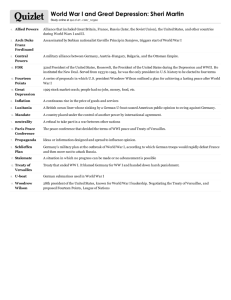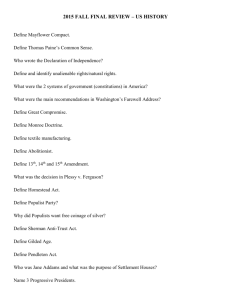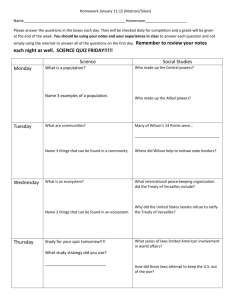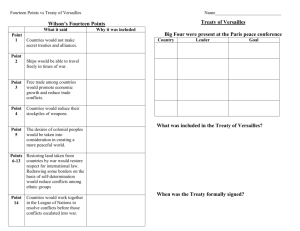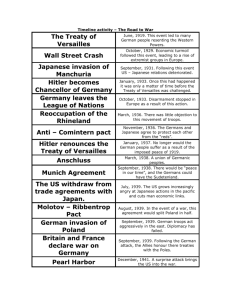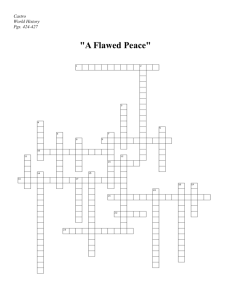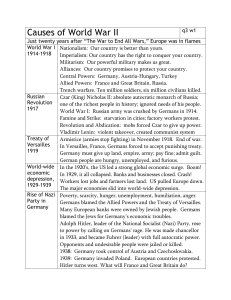The Influence of the Treaty of Versailles on World War II The Treaty
advertisement
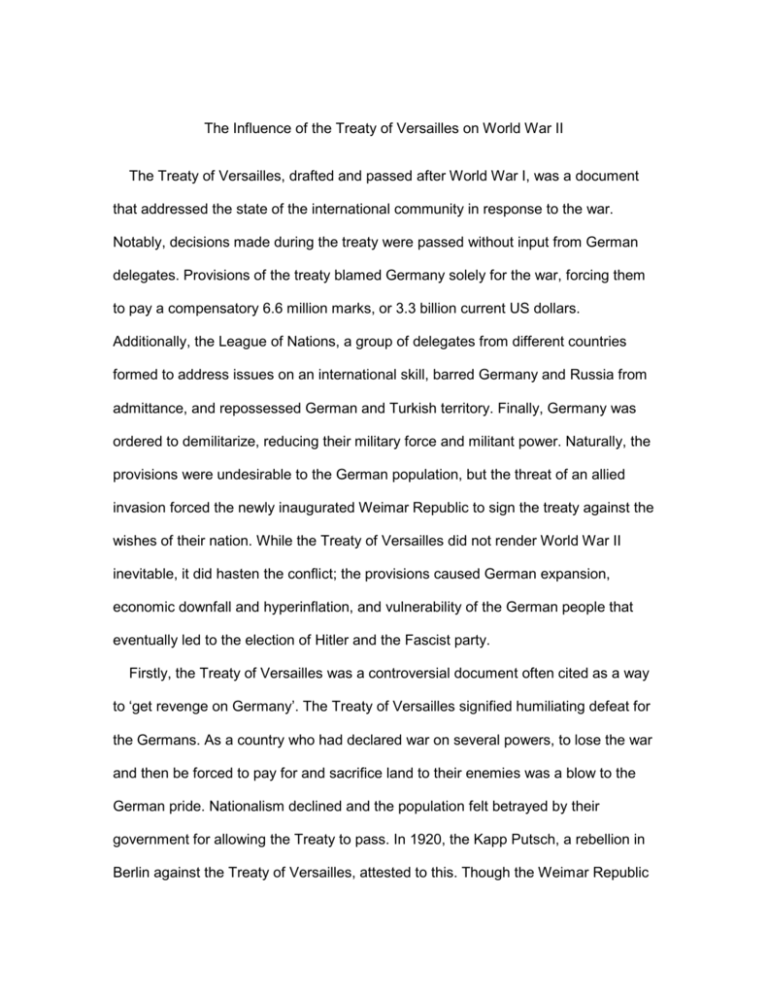
The Influence of the Treaty of Versailles on World War II The Treaty of Versailles, drafted and passed after World War I, was a document that addressed the state of the international community in response to the war. Notably, decisions made during the treaty were passed without input from German delegates. Provisions of the treaty blamed Germany solely for the war, forcing them to pay a compensatory 6.6 million marks, or 3.3 billion current US dollars. Additionally, the League of Nations, a group of delegates from different countries formed to address issues on an international skill, barred Germany and Russia from admittance, and repossessed German and Turkish territory. Finally, Germany was ordered to demilitarize, reducing their military force and militant power. Naturally, the provisions were undesirable to the German population, but the threat of an allied invasion forced the newly inaugurated Weimar Republic to sign the treaty against the wishes of their nation. While the Treaty of Versailles did not render World War II inevitable, it did hasten the conflict; the provisions caused German expansion, economic downfall and hyperinflation, and vulnerability of the German people that eventually led to the election of Hitler and the Fascist party. Firstly, the Treaty of Versailles was a controversial document often cited as a way to ‘get revenge on Germany’. The Treaty of Versailles signified humiliating defeat for the Germans. As a country who had declared war on several powers, to lose the war and then be forced to pay for and sacrifice land to their enemies was a blow to the German pride. Nationalism declined and the population felt betrayed by their government for allowing the Treaty to pass. In 1920, the Kapp Putsch, a rebellion in Berlin against the Treaty of Versailles, attested to this. Though the Weimar Republic was actively forced to sign the document, the German population continued resented their government, as displayed in the German newspaper Deutsche Zeitung’s June 28th, 1919 edition, which stated, “The disgraceful Treaty is being signed today. Don’t forget it! We will never stop until we win back what we deserve.” (Opinion of Versailles, 4). The signing led to a distrust of the new government, and when the rising fascist party, stated that they would abolish the Treaty of Versailles, the German population naturally gravitated towards their campaign. Respect for the Weimar Republic lowered dramatically and a new government who promised to restore Germany’s power and reputation was welcomed enthusiastically.The state of Germany was rendered vulnerable economically and loyally, the majority of the population rejecting the Treaty and resenting their government for accepting it. Hyperinflation in Germany was the result of a provision in the Treaty of Versailles that stated that Germany must pay for the world’s losses. Altogether surmounting a total of 6.6 million British pounds, or 33 billion US dollars in today’s market, the money would pay for the damages suffered by the international community. At first, Germany began to pay the reparations in resources such as coal and railroad equipment. However, these resources were supplemented by physical money, some borrowed from powers such as the United States. The German government produced an excess of bills towards this payment, the sudden influx in physical money reducing the value of the German mark. Throughout the crisis, the mark fell from being valued at 4.2 marks per dollar to 8.91 (The German Hyperinflation, 1923, 2). In 1923, at the pinnacle of the event, one U.S. dollar was valued at one trillion marks, and the money was virtually worthless. Germans were known to use bills to fuel their stoves in lieu of wood, and street cleaners swept money off the streets. Resultant of the suffering currency, the German economy was rendered unstable. This instability was reflected in the wealth of the German public, who were vulnerable to the fascist campaign, a party that lobbied to improve the economy and build Germany as an international superpower. The Treaty of Versailles led to the German need for wealth, and production of currency incited hyperinflation that destroyed the value of the German mark and unsettled the economy. Hitler’s promises of a better Germany convinced the German people to vote him into power, a result of hyperinflation from the Treaty of Versailles. The Treaty of Versailles repossessed German territory, leading to the German desire for expansion and the regaining of their lands. The fourth provision of the Treaty of Versailles stated that “Germany renounces all rights, titles and privileges whatever in or over territory which belonged to her or to her allies, and all rights, titles and privileges whatever their origin which she held as against the Allied and Associated Powers” (The Avalon Project: The Versailles Treaty June 28, 1919, 1). The provision sacrificed 13% of Germany’s European territory and 10% of its population (Map, 3), losing even more territory in colonies and imperialised land. The loss of land detailed in the Treaty, about 27,000 square miles, was accompanied by over 6 million Germans, separating the German nation, industries, and population. This angered German pride and nationalism, as the loss further reduced German power and prestige, and example of which was the surrendering of the AlsaceLorraine to the longtime enemy, France. Hence, when Hitler promised to regain lost German land and expand the nation to gain power and respect, the German public supported the cause with vigour, eventually electing Adolf Hitler into office. The Treaty of Versailles repossessed German land, and the loss of German territory and people contributed to the hatred directed towards the government and tore nationalism and the country apart. The German will to regain this territory helped Hitler come to power. It can be argued that the Treaty of Versailles was the direct cause of World War II. No doubt, the provisions of the treaty led to chaos and vulnerability within Germany that allowed leaders such as Hitler and the fascist party rise to power. The abolishment of the Treaty of Versailles was largely a part of Hitler’s campaign. However, as other major causes of World War II included appeasement demonstrated by the international community and the inefficiency of the League of Nations, it can then be stated that the Treaty of Versailles did not solely make World War II inevitable. Previous campaigns suggest that Adolf Hitler’s intentions for Germany’s international power were innate, and while the Treaty’s signing helped bring Hitler to power, it may be assumed that he would have influenced German politics regardless. Hence, the Treaty of Versailles built tensions and hastened the war, but was not the sole impetus of World War II. The Treaty of Versailles was established after World War I to limit Germany’s power and hopefully help prevent another world war. However, the provisions of the Treaty of Versailles rendered Germany vulnerable and aching for revenge, the result of which led to the rise of Hitler and indirectly, World War II. Therefore, it can be argued that the Treaty of Versailles, and World War I in extension, led indirectly to World War II. Had certain provisions of the Treaty of Versailles not been established or agreed to, the second world war may have been prevented. As World War II witnessed involvement from major powers such as Great Britain, France, Japan, Italy, and the United States, it can be inferred that the conflict was extremely influential, and in extension, indirect causes of the war, such as the Treaty of Versailles, are important to history. World War II saw the Holocaust and focused the international eye on discrimination and genocide. The war itself resulted in approximately 50 to 70 million casualties, 11 million deaths as direct results of the Holocaust. The Treaty of Versailles instigated in part the conflict and could therefore be seen indirectly as responsible for these deaths. Extending further, the treaty may be seen as a bad decision, as it heightened conflict between Germany and much of the international community. Therefore, the debate as to whether the Treaty of Versailles influenced World War II is crucial, as it can be used to assert responsibility for the deaths of millions. Works cited1. "The Avalon Project: The Versailles Treaty June 28, 1919." The Avalon Project: The Versailles Treaty June 28, 1919. Lillian Goldman Law Library, n.d. Web. 19 Dec. 2013. <http://avalon.law.yale.edu/imt/partiv.asp>. 2. Goodman, George J. "The German Hyperinflation, 1923." PBS.com. PBS, 1981. Web. 19 Dec. 2013. <http://www.pbs.org/wgbh/commandingheights/shared/minitextlo/ess_germanh yperinflation.html>. 3. "Map." German Territorial Losses, Treaty of Versailles, 1919. United States Holocaust Memorial Museum, n.d. Web. 17 Dec. 2013. <http://www.ushmm.org/outreach/en/media_nm.php?MediaId=1620>. 4. "Opinion of Versailles." BBC News. BBC, n.d. Web. 19 Dec. 2013. <http://www.bbc.co.uk/schools/gcsebitesize/history/mwh/ir1/opinionsrev2.shtml >.
